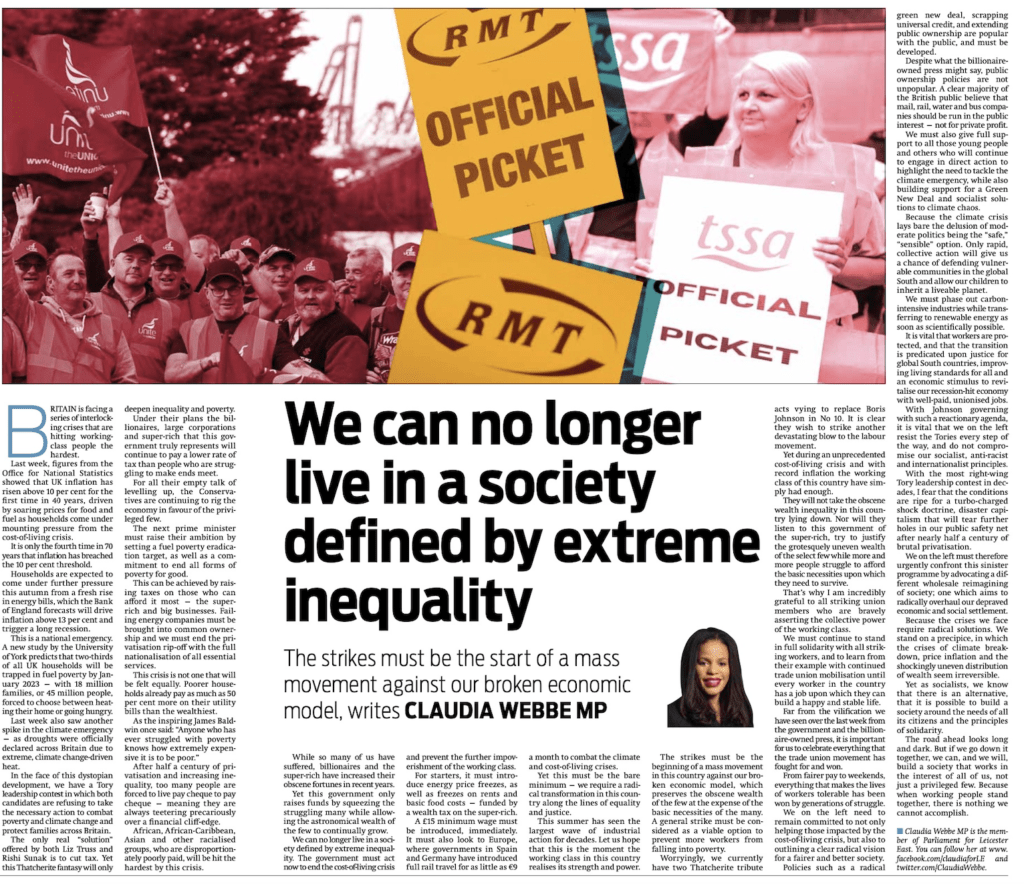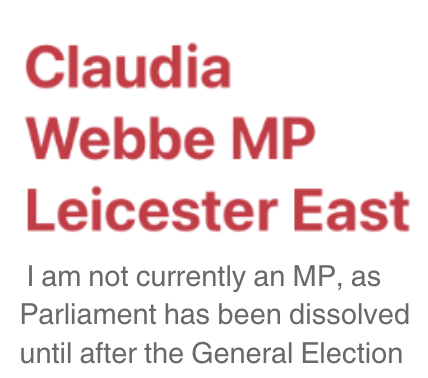
We can no longer live in a society defined by extreme inequality
By Claudia Webbe MP
The strikes must be the beginning of a mass movement in this country against our broken economic model, writes CLAUDIA WEBBE MP
BRITAIN is facing a series of interlocking crises that are hitting working-class people the hardest.
Last week, figures from the Office for National Statistics showed that UK inflation has risen above 10 per cent for the first time in 40 years, driven by soaring prices for food and fuel as households come under mounting pressure from the cost-of-living crisis.
It is only the fourth time in 70 years that inflation has breached the 10 per cent threshold.
Households are expected to come under further pressure this autumn from a fresh rise in energy bills, which the Bank of England forecasts will drive inflation above 13 per cent and trigger a long recession.
This is a national emergency. A new study by the University of York predicts that two-thirds of all UK households will be trapped in fuel poverty by January 2023 — with 18 million families, or 45 million people, forced to choose between heating their home or going hungry.
Last week also saw another spike in the climate emergency — as droughts were officially declared across Britain due to extreme, climate change-driven heat.
In the face of this dystopian development, we have a Tory leadership contest in which both candidates are refusing to take the necessary action to combat poverty and climate change and protect families across Britain.
The only real “solution” offered by both Liz Truss and Rishi Sunak is to cut tax. Yet this Thatcherite fantasy will only deepen inequality and poverty.
Under their plans the billionaires, large corporations and super-rich that this government truly represents will continue to pay a lower rate of tax than people who are struggling to make ends meet.
For all their empty talk of levelling up, the Conservatives are continuing to rig the economy in favour of the privileged few.
The next prime minister must raise their ambition by setting a fuel poverty eradication target, as well as a commitment to end all forms of poverty for good.
This can be achieved by raising taxes on those who can afford it most — the super-rich and big businesses. Failing energy companies must be brought into common ownership and we must end the privatisation rip-off with the full nationalisation of all essential services.
This crisis is not one that will be felt equally. Poorer households already pay as much as 50 per cent more on their utility bills than the wealthiest.
As the inspiring James Baldwin once said: “Anyone who has ever struggled with poverty knows how extremely expensive it is to be poor.”
After half a century of privatisation and increasing inequality, too many people are forced to live pay cheque to pay cheque — meaning they are always teetering precariously over a financial cliff-edge.
African, African-Caribbean, Asian and other racialised groups, who are disproportionately poorly paid, will be hit the hardest by this crisis.
While so many of us have suffered, billionaires and the super-rich have increased their obscene fortunes in recent years.
Yet this government only raises funds by squeezing the struggling many while allowing the astronomical wealth of the few to continually grow.
We can no longer live in a society defined by extreme inequality. The government must act now to end the cost-of-living crisis and prevent the further impoverishment of the working class.
For starters, it must introduce energy price freezes, as well as freezes on rents and basic food costs — funded by a wealth tax on the super-rich.
A £15 minimum wage must be introduced, immediately. It must also look to Europe, where governments in Spain and Germany have introduced full rail travel for as little as €9 a month to combat the climate and cost-of-living crises.
Yet this must be the bare minimum — we require a radical transformation in this country along the lines of equality and justice.
This summer has seen the largest wave of industrial action for decades. Let us hope that this is the moment the working class in this country realises its strength and power.
The strikes must be the beginning of a mass movement in this country against our broken economic model, which preserves the obscene wealth of the few at the expense of the basic necessities of the many. A general strike must be considered as a viable option to prevent more workers from falling into poverty.
Worryingly, we currently have two Thatcherite tribute acts vying to replace Boris Johnson in No 10. It is clear they wish to strike another devastating blow to the labour movement.
Yet during an unprecedented cost-of-living crisis and with record inflation the working class of this country have simply had enough.
They will not take the obscene wealth inequality in this country lying down. Nor will they listen to this government of the super-rich, try to justify the grotesquely uneven wealth of the select few while more and more people struggle to afford the basic necessities upon which they need to survive.
That’s why I am incredibly grateful to all striking union members who are bravely asserting the collective power of the working class.
We must continue to stand in full solidarity with all striking workers, and to learn from their example with continued trade union mobilisation until every worker in the country has a job upon which they can build a happy and stable life.
Far from the vilification we have seen over the last week from the government and the billionaire-owned press, it is important for us to celebrate everything that the trade union movement has fought for and won.
From fairer pay to weekends, everything that makes the lives of workers tolerable has been won by generations of struggle.
We on the left need to remain committed to not only helping those impacted by the cost-of-living crisis, but also to outlining a clear radical vision for a fairer and better society.
Policies such as a radical green new deal, scrapping universal credit, and extending public ownership are popular with the public, and must be developed.
Despite what the billionaire-owned press might say, public ownership policies are not unpopular. A clear majority of the British public believe that mail, rail, water and bus companies should be run in the public interest — not for private profit.
We must also give full support to all those young people and others who will continue to engage in direct action to highlight the need to tackle the climate emergency, while also building support for a Green New Deal and socialist solutions to climate chaos.
Because the climate crisis lays bare the delusion of moderate politics being the “safe,” “sensible” option. Only rapid, collective action will give us a chance of defending vulnerable communities in the global South and allow our children to inherit a liveable planet.
We must phase out carbon-intensive industries while transferring to renewable energy as soon as scientifically possible.
It is vital that workers are protected, and that the transition is predicated upon justice for global South countries, improving living standards for all and an economic stimulus to revitalise our recession-hit economy with well-paid, unionised jobs.
With Johnson governing with such a reactionary agenda, it is vital that we on the left resist the Tories every step of the way, and do not compromise our socialist, anti-racist and internationalist principles.
With the most right-wing Tory leadership contest in decades, I fear that the conditions are ripe for a turbo-charged shock doctrine, disaster capitalism that will tear further holes in our public safety net after nearly half a century of brutal privatisation.
We on the left must therefore urgently confront this sinister programme by advocating a different wholesale reimagining of society; one which aims to radically overhaul our depraved economic and social settlement.
Because the crises we face require radical solutions. We stand on a precipice, in which the crises of climate breakdown, price inflation and the shockingly uneven distribution of wealth seem irreversible.
Yet as socialists, we know that there is an alternative, that it is possible to build a society around the needs of all its citizens and the principles of solidarity.
The road ahead looks long and dark. But if we go down it together, we can, and we will, build a society that works in the interest of all of us, not just a privileged few. Because when working people stand together, there is nothing we cannot accomplish.
Claudia Webbe MP is the member of Parliament for Leicester East. You can follow her at www.facebook.com/claudiaforLE and twitter.com/ClaudiaWebbe


